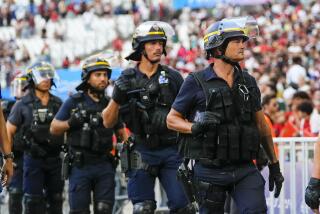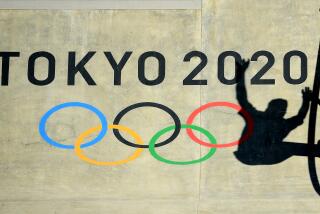IOC Chief Lauds Security Effort
- Share via
ATHENS — Jacques Rogge, president of the International Olympic Committee, said Monday that organizers of the 2004 Games have “complete confidence” in Greece’s security plan for the Athens Olympics, a $1.5-billion effort that includes 70,000 security personnel and NATO air and sea patrols.
“These efforts are justified as, going beyond the Games, what is at stake is protecting society, democracy, civilization and freedom,” Rogge told IOC delegates.
Rogge also urged the 202 nations gathering here to “cooperate fully and follow totally the instructions of the Greek government,” rather than rely on their own security forces.
“Security requires a unified command structure,” he added.
Gianna Angelopoulos-Daskalaki, president of the Athens 2004 organizing committee, said Greece was prepared to offer a “first-class celebration for the Olympics,” one aimed at showcasing a modern Greece while highlighting the Olympic ideals of peaceful competition through sport.
Despite construction delays that have plagued Athens for several years, the venues are ready, Angelopoulos-Daskalaki said, along with the city itself, its technological and transportation systems and thousands of volunteers.
“These Games are a homecoming,” she told reporters, noting that the modern Olympics began here in 1896. “After 108 years, they come back here. These Games, they have a special meaning.”
The 2004 Summer Games are also the first since the Sept. 11, 2001, terrorist attacks in the United States. Angelopoulos-Daskalaki said it was organizers’ intent that the Games show that humanity’s similarities “are much more powerful than what makes us different.”
Rogge’s remarks came in a wide-ranging speech that, by tradition, is delivered by the IOC president in advance of every Games. It is designed to serve as a pep talk to the IOC members and provide a “state of the Olympics” for the public.
Rogge touched on issues as varied as doping, the size and scope of the Games, ethics concerns and security.
The $1.5-billion tab is five times more than what was spent on security in Sydney, Australia, at the 2000 Games.
The security effort includes a new $300-million command-and-control system that relies on hundreds of security cameras installed in and around Athens. Another notable security feature is a zeppelin, circling the skies over the city, packed with cameras and spyware.
Rogge has often said that security has been the top priority for the IOC since the 1972 Munich Games. At those Olympics, 11 Israeli athletes and coaches were kidnapped and murdered by Palestinian terrorists.
Rogge said Monday of those murdered in 1972, “I pay tribute once again to the victims of that tragedy, whom we shall never forget.”
The onset of the 2004 Games has been marked by concerns about doping, many centered on the U.S. team, in particular the American track and field program.
In the most recent case involving a U.S. track and field athlete, the U.S. Anti-Doping agency on Monday announced that Bernard Williams, 26, of Gainesville, Fla., who is due to run in the 200 meters at the 2004 Games, was given a public warning after a positive test for marijuana on June 5 at a meet in Seville, Spain.
Williams won a gold medal in the 400-meter relay in Sydney. He is the 2003 U.S. 100-meter champion.
Track and field accounts for 13 of the 24 sanctions USADA has announced this year. In all, more than 20 U.S. track or field athletes have been sanctioned, implicated or identified as the focus of a doping-related inquiry since Jan. 1.
Rogge said in reference to a string of doping-related news reports, “Paradoxically, this is an encouraging sign that the fight against doping is gaining ground, and that is becoming increasingly hard to cheat.”
The IOC announced over the weekend that it was provisionally suspending the membership privileges of Ivan Slavkov of Bulgaria. He figured in a BBC television broadcast aired Wednesday that centered on the role of lobbyists in the Olympic host-city bid process.
Four lobbyists were also featured, and the IOC declared them persona non grata.
“Let us respect and ensure respect of strict ethics, and sanction the athletes and sports leaders who do not do so,” Rogge said.
More to Read
Go beyond the scoreboard
Get the latest on L.A.'s teams in the daily Sports Report newsletter.
You may occasionally receive promotional content from the Los Angeles Times.






